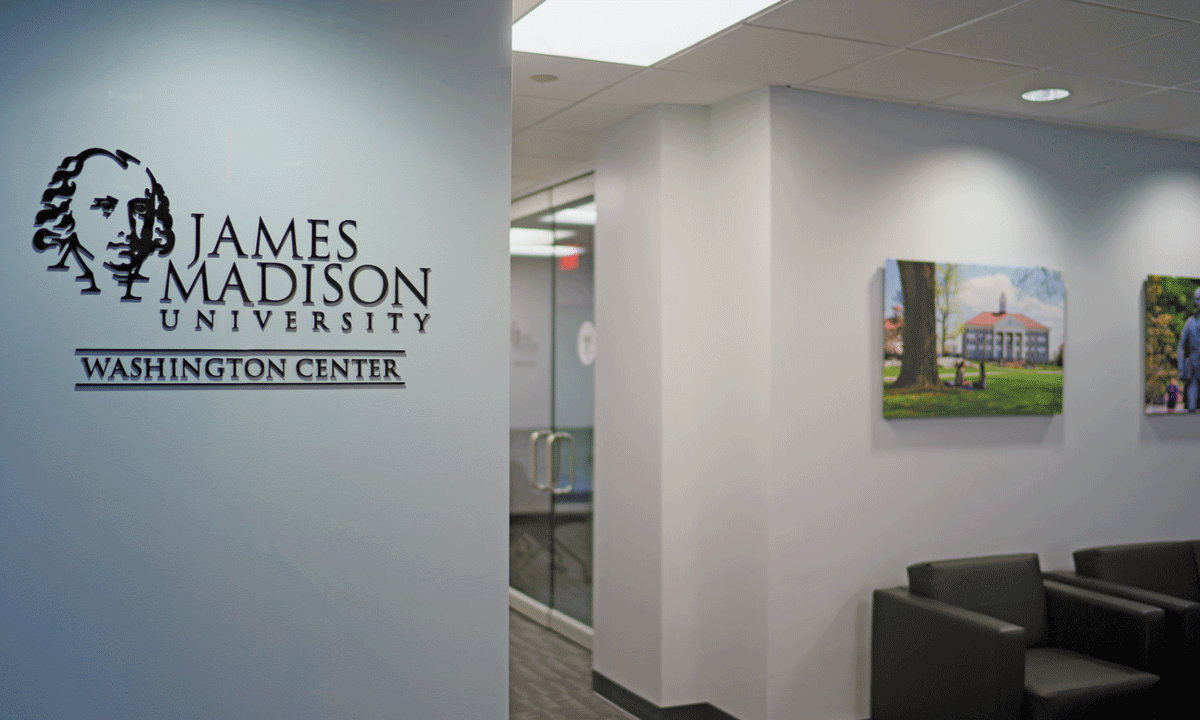Hanging our shingle in D.C.
Nation and World
JMU expands presence in nation's capital
By Janet L. Smith ('81)
From Winter 2016 Madison.
The success of an important JMU academic program — the Washington Semester — is leading the university to expand its presence in the nation's capital with the creation of the JMU Washington Center.
Overlooking 16th Street in the District's Dupont Circle neighborhood, the third-floor suite offers a multipurpose classroom/event space, a conference room and two office spaces for use by the entire university. Until August, when the Washington Center opened, the Washington Semester used a classroom and rented a small office in the building where students enrolled in the Department of Political Science's program lived.
University officials looked at physical space options over the last two years and decided that 1400 16th St., NW, would meet the needs of not only the Washington Semester but also other academic units and D.C.-area alumni of the university. "There was a desire to hang a shingle in the Washington area, since many of our students are either from, or settle in, the Washington area," said Charles H. Blake, professor and head of political science.
"We recognized that this would be space for the entire university," said David A. Jones, professor of political science and professor-in-residence for the JMU Washington Semester program. "It was an opportunity for us to improve our classroom and event space while expanding opportunities for the university as a whole."
'It was really the time to enhance that involvement by establishing a Washington presence for JMU.' — David A. Jones, professor-in-residence, Washington Semester program
Begun in 1997 as a spring semester program, the Washington Semester has grown into a two-semester program offering two separate areas of study: U.S. politics and policy (fall) and global affairs (spring). Approximately 450 students from disciplines including political science, international affairs, public policy and administration, history, English, media arts and design, and writing, rhetoric and technical communication have benefited from the program's emphasis on internships, courses and guest speakers, including many JMU alumni.
While other schools have semester-long programs in Washington, Jones said, "Ours is unique in that we've structured the program so that students can work full time, Monday through Thursday, and take on long-term projects as part of their internships."
In its nearly two decades, the Washington Semester has supported JMU students in internships with such prestigious organizations and governmental offices as the White House, State Department, Congress, C-SPAN, U.S. Trade Representative, Amnesty International, American Enterprise Institute, Women for Women International and the Woodrow Wilson International Center for Scholars.
The technologically up-to-date new space is a welcoming place for JMU to invite its increasingly active alumni base that is interested in the Washington Semester and is involved in ways such as returning to present about their D.C.-based work and to serve as mentors and networking contacts, Jones said. "It was really the time to enhance that involvement," he added, "by establishing a Washington presence for JMU. We felt like it was time to enhance that involvement with an actual physical presence. We already had a presence in D.C., but it wasn't a physical one. We were always a guest wherever we held our own events and class sessions."

"We are bringing a part of JMU to Washington," Jones said. "We want to host JMU scholars who can share their expertise and present their research with the Washington area. We want to encourage other JMU units to use the new space and to consider launching their own Washington-based academic programs."
The new JMU Washington Center, overlooking 16th Street in the District's Duport Circle neighborhood, is the home of Madison's well-established Washington Semester program, during which students complete internships in the capital region. The third-floor suite, which includes a multipurpose classroom/event space, a conference room and two offices, is also available for use by the entire university.
